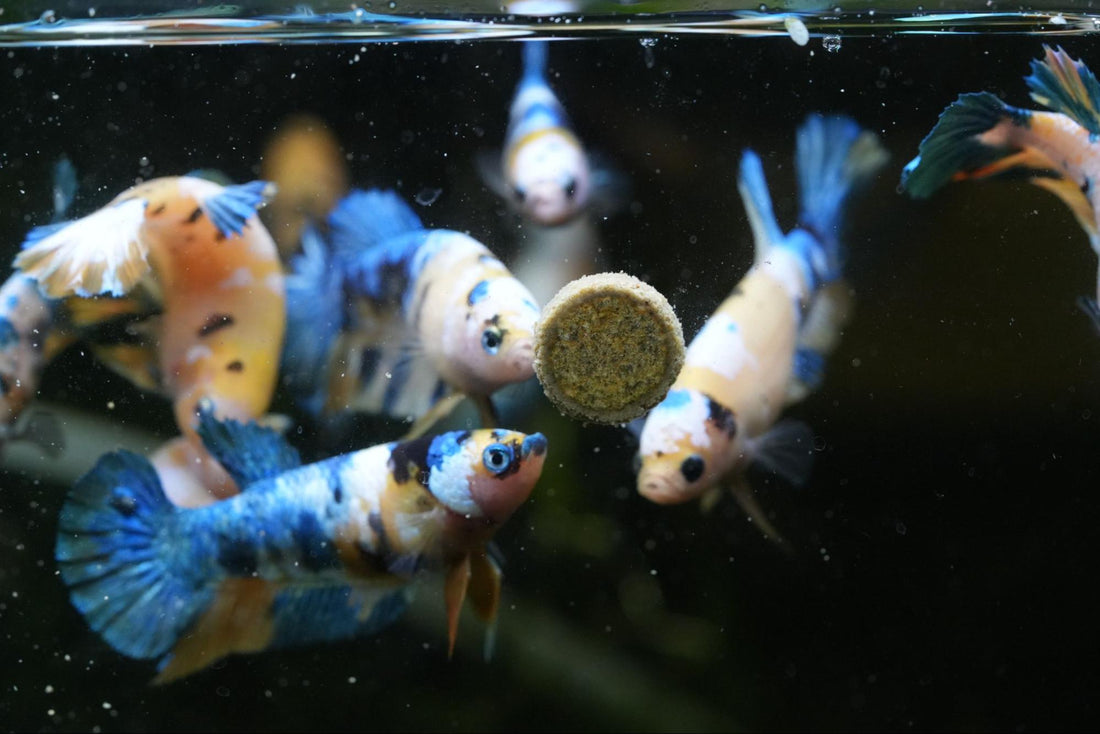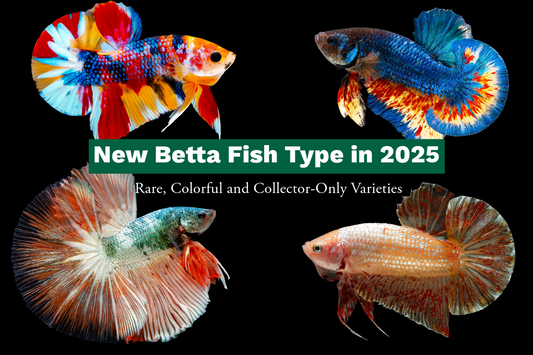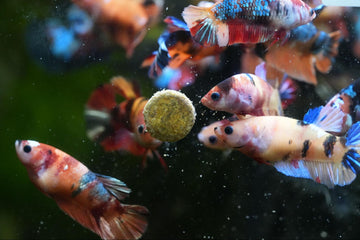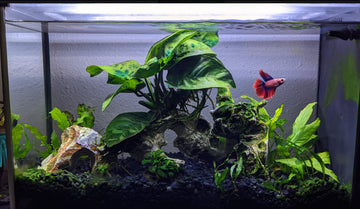I feed my male betta once a day with frozen bloodworms. Sometimes I give jm 3-4 high protein pellets.
Is this ok?
Chuck
What are The Best Foods for Betta Fish? The Science Behind Feeding Them

Betta fish are beloved for their vibrant colors and unique personalities, making them a favorite among aquarium lovers. However, many owners wonder what the best diet is for these fascinating fish.
In the wild, bettas are carnivores that eat insects and small crustaceans, so it’s important to mimic that diet in captivity. Therefore, feeding your betta the right food is essential for keeping them healthy and colorful.
In this article, we’ll explore the different types of food available and explore what kind of betta fish food you can choose to help them live a long, vibrant life.
Betta Fish and Their Natural Diet
Bettas are carnivorous by nature, hailing from shallow waters in Southeast Asia where they feed on insects, larvae, and small aquatic creatures.

Understanding what bettas would eat in the wild is the first step toward making sure they get the right nutrients in your tank.
- Proteins: Protein is the most essential component of a betta's diet because it makes up the bulk of what they naturally consume. The ideal diet for a betta fish should be protein-rich to support muscle development, organ function, and overall vitality. A study published in the Journal of Fish Biology notes that diets with 45-50% protein content are optimal for betta growth and reproduction .
- Fats: Fats are another important energy source. Bettas, especially those bred for vibrant colors and long fins, benefit from a balanced intake of fat to support healthy growth and maintain those intense colors. According to another research, a moderate fat content of 6-8% supports energy without causing obesity or related health problems .
- Fibers and Carbohydrates: While bettas don't naturally consume much fiber or carbohydrates, a small amount can aid in digestion.
However, many commercial foods for bettas contain fillers, which are unnecessary and can lead to digestive issues if over consumed. It is recommended to feed a betta-specific pellet or live food over general tropical fish food to avoid overloading them with indigestible matter.
Top Best Foods for Betta Fish
To help you choose the best grub for your fishy friend, here's a handy table comparing different types of betta food:
|
Food Type |
Protein Content |
Fat Content |
Digestive Aid |
Color Enhancement |
Notes |
|
Betta Pellets |
High |
Moderate |
Moderate |
Varies (depending on ingredients) |
Balanced and convenient for everyday feeding. |
|
Frozen/Live Bloodworms |
Very High |
High |
Low |
High |
Rich in nutrients. Use as a treat to avoid overfeeding. |
|
Frozen/Live Brine Shrimp |
High |
Moderate |
Low |
High |
Enhances color. Promotes fin growth. |
|
Daphnia |
Moderate |
Low |
High |
Moderate |
Helps with digestion and prevents constipation. |
|
Mosquito Larvae |
High |
Moderate |
Low |
High |
Natural food for bettas. Ideal as a supplement. |
|
Freeze-Dried Tubifex Worms |
High |
Moderate |
Low |
Moderate |
Rehydrate before feeding. Use sparingly. |
|
Frozen Mysis Shrimp |
High |
Low |
Low |
High |
Lower fat content. Good for regular feeding. |
Foods to Avoid Feeding Your Betta
When selecting food for your betta, it's important to avoid certain types that can be detrimental to their health.
Bettas are carnivorous and require a protein-rich diet, so foods high in fillers like wheat or soy should be avoided. These ingredients offer little nutritional value and can lead to digestive issues and bloating.
Steer clear of:
- Foods with wheat, soy, or other plant-based fillers as the main ingredients
- Large, hard pellets that may be difficult for bettas to swallow
- Freeze-dried foods that can expand in the stomach and cause constipation
- Feeder fish like goldfish, which can transmit diseases and parasites
To keep your betta healthy and happy, focus on providing a varied diet that has the right balance of nutrients!
The Role of Nutrients in Health and Longevity
Keeping Your Betta's Colors Bright and Skin Healthy
One of the most eye-catching things about betta fish is their bright colors, and the nutrients in their diet play a big role in how vibrant they look.

Carotenoids are pigments found in many foods that can boost red, yellow, and orange shades. Feeding your betta foods rich in carotenoids, like shrimp or brine shrimp, can help keep their colors looking sharp and bright.
Carotenoids also have antioxidant properties, which help protect against cellular damage and may even help your betta live longer.
In addition to carotenoids, astaxanthin, another pigment, is often used in high-quality betta food to intensify blue and green hues.
Keeping Your Betta's Fins and Scales Healthy
Another key to keeping your betta in tip-top shape is making sure their fins and scales stay in good condition.
If your betta isn't getting the right nutrients, their fins can become weak and brittle, making them more likely to split or tear. Foods that are high in omega-3 fatty acids, like daphnia and bloodworms, help keep your betta's fins and scales strong and healthy.

Vitamin C is also super important for helping your betta's body repair and regrow tissue. If your betta isn't getting enough vitamin C, they might end up with fin rot or have a hard time healing from little injuries.
To give your betta's immune system a boost and keep them resilient, you can:
- Feed them foods that are packed with vitamins
- Occasionally give them live food as a treat
This will help keep your betta's fins and scales in great shape!
Keeping Your Betta's Immune System Strong
Just like us, bettas stay healthier when their diet gives their immune system a boost. Vitamins A, D, and E are super important for this:
- Vitamin A helps cells grow and keeps the heart, lungs, and kidneys working right.
- Vitamin D, which isn't always thought about when it comes to fish, is key for absorbing calcium, which is needed for strong bones.
- Vitamin E acts as an antioxidant to reduce inflammation and prevent diseases.
Minerals like zinc and magnesium are also crucial for immune health. Many high-quality betta foods have these added in, so you can easily make sure your fish gets what they need without having to give them extra supplements.

By feeding your betta a balanced diet with the right vitamins and minerals, you'll be helping their immune system stay strong and keep them happy and healthy!
Common Myths and Mistakes About Betta Feeding
Myth 1: Bettas Can Survive on Plant-Based Foods
One common myth is that bettas can live on a plant-based diet. This idea might come from the fact that bettas sometimes nibble on plants, which people often mistake for actual eating.
While plants can offer some minor digestive benefits, they don’t provide the protein and fat that bettas need to thrive.
Experts agree that sticking to a plant-only diet can lead to malnutrition, weight loss, and even death for your betta.s .
Myth 2: Feeding Bettas Only Once a Day is Enough
While frequency and portion sizes should be carefully managed, feeding a betta only once per day is not typically recommended.
This practice stems from the belief that bettas have slow metabolisms and can handle long fasting periods. In reality, offering smaller meals twice a day is much more effective in preventing bloating, constipation, and other digestive problems.
Research shows that bettas fare better with controlled but regular feeding schedules, which match their metabolism and help maintain energy levels.
This also reduces the likelihood of overeating, which is a common mistake when meals are less frequent but larger.
Myth 3: Bettas Should Eat Only Live Food
While live food is a great addition to a betta's diet, feeding them only live food can actually lead to an unbalanced diet.
Pellets and frozen foods are specially made to give bettas all the nutrients they need. Live food, on the other hand, can sometimes be missing important vitamins and minerals. It can also sometimes carry diseases.
It's important to feed bettas a varied diet with pellets, live food, and frozen food. This helps make sure they get all the nutrients they need to stay healthy in the long run.
Myth 4: All Betta Pellets Are the Same
Another common mistake is thinking that all betta pellets are created equal. Many commercial pellets are filled with low-quality ingredients and fillers, which can lead to digestive problems.
It’s important to choose high-quality, betta-specific pellets that list whole fish or shrimp as the first ingredient. Tests have shown that lower-quality pellets can make bettas lethargic and dull their colors within a month.
In contrast, higher-quality pellets can significantly boost their energy levels and enhance their color vibrancy.
Find Your Ideal Betta Fish at Tropicflow
Now that you know how to feed your betta the best possible diet, it’s time to ensure they come from a reputable source.
Tropicflow is a premium provider of betta fish, specializing in healthy, vibrant, and well-cared-for fish. When you purchase a betta from Tropicflow, you’re not just buying a fish—you’re investing in quality.

We ensures that your bettas are bred and raised in optimal conditions, receiving the best care and diet from the start. This means you’ll get a betta that is healthy, active, and ready to thrive in your aquarium.
With Tropicflow, you’re not just choosing a betta—you’re choosing peace of mind knowing your pet has had the best start in life.











comment